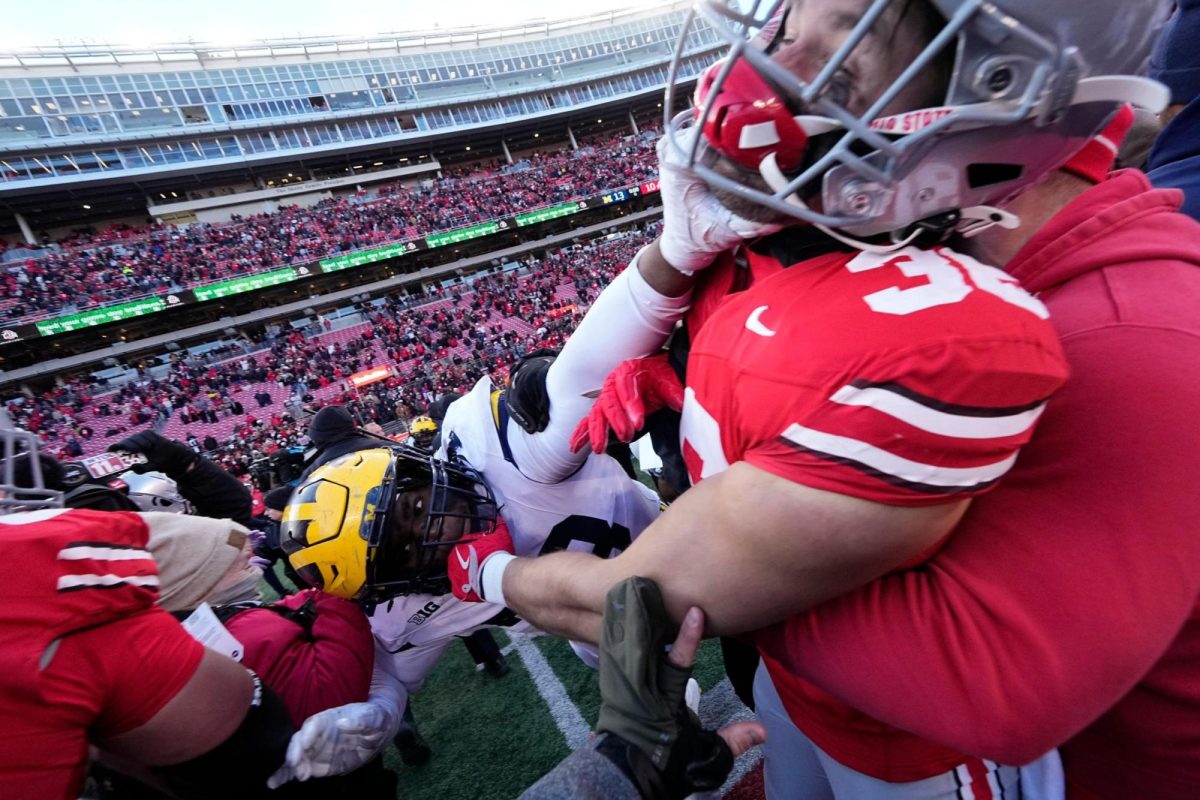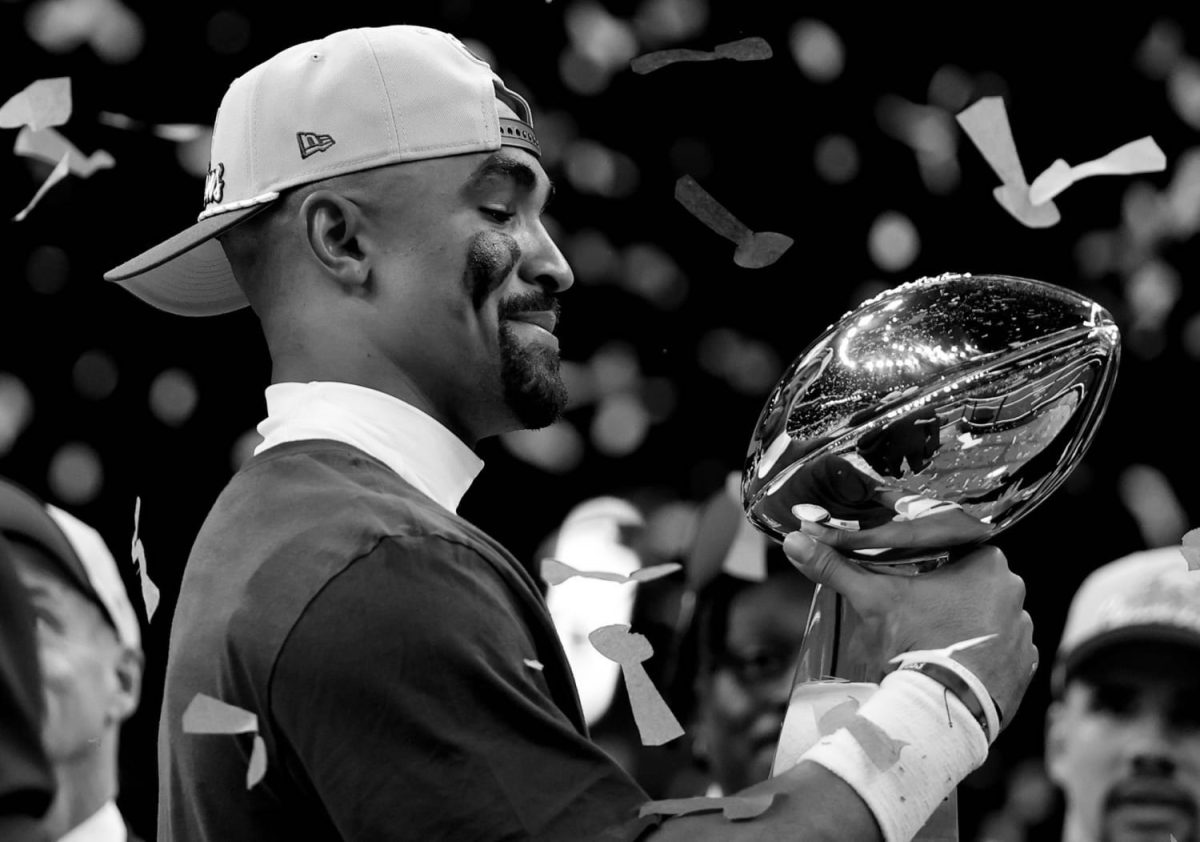The storied rivalry between the Ohio State Buckeyes and University of Michigan Wolverines ended wildly this past week, culminating not only in a shocking 13–10 upset victory for Michigan, but also in a heated postgame brawl that magnified the intense emotions surrounding the game of football. While the passion and dedication displayed by players and fans alike are part of what makes college football so special, the fights that erupted raise questions about the limits of sportsmanship and the role of emotional control in high-stakes competition.
After Michigan’s narrow victory, a Wolverines player attempted to plant their team flag at midfield in Ohio Stadium, a gesture seen by many as symbolic disrespect. Ohio State players, fresh off the sting of defeat, responded aggressively, and what began as a moment of celebration quickly escalated into chaos. Punches were thrown, tempers flared, and, eventually, law enforcement — including Ohio State University Police — intervened to break up the melee. Pepper spray was deployed to disperse the crowd, leaving several players visibly affected. One officer required medical attention, and the Big Ten later issued $100,000 fines to both programs for their involvement in the altercation. The fallout highlighted a recurring issue across college football: the thin line between celebrating a hard-fought win and antagonizing an opponent. This isn’t the first time flag planting has caused conflict in college football. Ohio Stadium has been the site of similar incidents, most notably in 2017 when then-Oklahoma quarterback Baker Mayfield planted his team’s flag after a victory over the Buckeyes. Mayfield later dismissed the significance, likening it to routine rivalries like the Texas vs. Oklahoma “Horns Down” gesture. This past week’s incidents weren’t confined to Ohio State and Michigan. Across the country, flag planting ignited similar brawls — including University of Florida vs. Florida State University, North Carolina State vs. University of North Carolina at Chapel Hill, and Arizona State University vs. University of Arizona.
Passion is intrinsic to sports. It fuels rivalries, drives players to their limits, and engages fans in ways that transcend the game itself. Ohio State Head Coach Ryan Day acknowledged the complexities of the situation, describing it as a “touchy subject” and emphasizing the need for the Big Ten and NCAA to evaluate appropriate measures to prevent such incidents in the future. Day’s sentiments were echoed by Michigan running back Kalel Mullings, who criticized Ohio State’s reaction as “classless.” Mullings argued that losing gracefully is as important as winning honorably, suggesting that the Buckeyes allowed their emotions to override their sportsmanship. However, others, like Las Vegas Raiders defensive end Maxx Crosby — a self-proclaimed Ohio State fan — took aim at Day himself, calling for the return of former Buckeyes coach Urban Meyer.
“I refuse to watch another game until Urban Meyer is the head coach,” Crosby said on his podcast.
Crosby expressed frustration not just with the loss but also with the program’s current direction under Day, who has lost four straight years to Michigan. Such criticism highlights the immense pressure coaches and players face in high-stakes rivalry games, where the outcome often feels larger than life.
The NCAA and Big Ten have a clear challenge ahead: striking a balance between preserving the emotional and physical intensity of college football, and ensuring safety and sportsmanship. Flag planting has become a gateway for conflict, with teams viewing it as a deliberate provocation. The Big Ten’s decision to levy fines is a step toward accountability, but it also raises questions about whether more robust measures, such as bans on flag planting or stricter penalties for postgame altercations, are necessary. Day, for his part, deferred to Big Ten Commissioner Tony Petitti, emphasizing that it’s up to the league to determine how to prevent future incidents. Meanwhile, Florida State Head Coach Mike Norvell and University of North Carolina at Chapel Hill’s Mack Brown have voiced similar concerns, calling for better postgame protocols to avoid such confrontations.
For players, moments like these serve as a reminder that the game ends at the final whistle. Emotional discipline is a critical component of sportsmanship, particularly in rivalry games where tensions run high. For fans, the incidents underscore the fine line between spirited support and antagonistic behavior. As Crosby’s heated remarks illustrate, the passion of college football can sometimes blur the boundaries of constructive criticism and outright hostility. Rivalries like Ohio State vs. Michigan are the lifeblood of college football, bringing unparalleled excitement and engagement to the sport. Yet, incidents like this week’s postgame brawl highlight the need for clear boundaries and a renewed emphasis on sportsmanship. Passion is a powerful force, but when it spills over into physical altercations and unsportsmanlike conduct, it undermines the very values that make college football so beloved.











